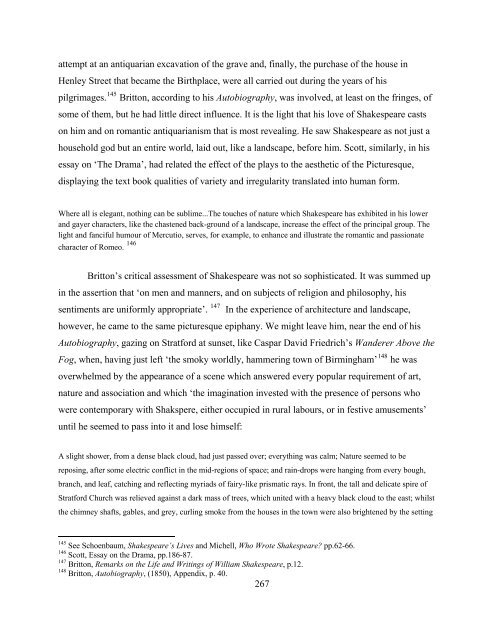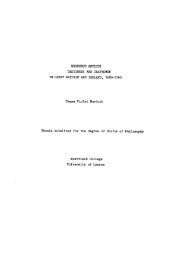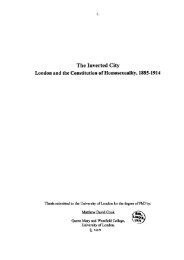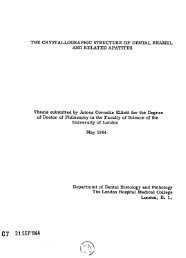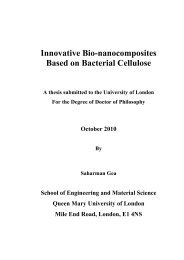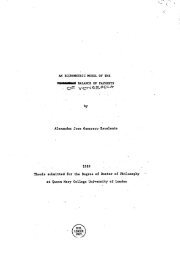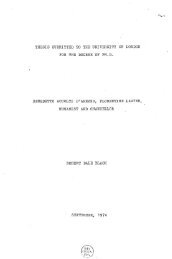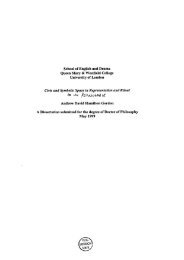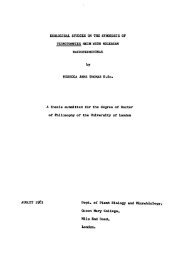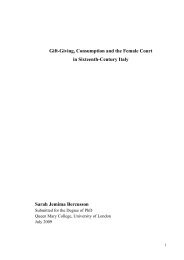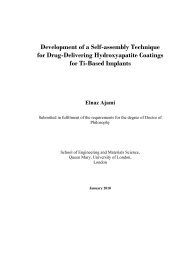Antiquaries in the Age of Romanticism: 1789-1851 - Queen Mary ...
Antiquaries in the Age of Romanticism: 1789-1851 - Queen Mary ...
Antiquaries in the Age of Romanticism: 1789-1851 - Queen Mary ...
You also want an ePaper? Increase the reach of your titles
YUMPU automatically turns print PDFs into web optimized ePapers that Google loves.
attempt at an antiquarian excavation <strong>of</strong> <strong>the</strong> grave and, f<strong>in</strong>ally, <strong>the</strong> purchase <strong>of</strong> <strong>the</strong> house <strong>in</strong><br />
Henley Street that became <strong>the</strong> Birthplace, were all carried out dur<strong>in</strong>g <strong>the</strong> years <strong>of</strong> his<br />
pilgrimages. 145 Britton, accord<strong>in</strong>g to his Autobiography, was <strong>in</strong>volved, at least on <strong>the</strong> fr<strong>in</strong>ges, <strong>of</strong><br />
some <strong>of</strong> <strong>the</strong>m, but he had little direct <strong>in</strong>fluence. It is <strong>the</strong> light that his love <strong>of</strong> Shakespeare casts<br />
on him and on romantic antiquarianism that is most reveal<strong>in</strong>g. He saw Shakespeare as not just a<br />
household god but an entire world, laid out, like a landscape, before him. Scott, similarly, <strong>in</strong> his<br />
essay on ‘The Drama’, had related <strong>the</strong> effect <strong>of</strong> <strong>the</strong> plays to <strong>the</strong> aes<strong>the</strong>tic <strong>of</strong> <strong>the</strong> Picturesque,<br />
display<strong>in</strong>g <strong>the</strong> text book qualities <strong>of</strong> variety and irregularity translated <strong>in</strong>to human form.<br />
Where all is elegant, noth<strong>in</strong>g can be sublime...The touches <strong>of</strong> nature which Shakespeare has exhibited <strong>in</strong> his lower<br />
and gayer characters, like <strong>the</strong> chastened back-ground <strong>of</strong> a landscape, <strong>in</strong>crease <strong>the</strong> effect <strong>of</strong> <strong>the</strong> pr<strong>in</strong>cipal group. The<br />
light and fanciful humour <strong>of</strong> Mercutio, serves, for example, to enhance and illustrate <strong>the</strong> romantic and passionate<br />
character <strong>of</strong> Romeo. 146<br />
Britton’s critical assessment <strong>of</strong> Shakespeare was not so sophisticated. It was summed up<br />
<strong>in</strong> <strong>the</strong> assertion that ‘on men and manners, and on subjects <strong>of</strong> religion and philosophy, his<br />
sentiments are uniformly appropriate’. 147 In <strong>the</strong> experience <strong>of</strong> architecture and landscape,<br />
however, he came to <strong>the</strong> same picturesque epiphany. We might leave him, near <strong>the</strong> end <strong>of</strong> his<br />
Autobiography, gaz<strong>in</strong>g on Stratford at sunset, like Caspar David Friedrich’s Wanderer Above <strong>the</strong><br />
Fog, when, hav<strong>in</strong>g just left ‘<strong>the</strong> smoky worldly, hammer<strong>in</strong>g town <strong>of</strong> Birm<strong>in</strong>gham’ 148 he was<br />
overwhelmed by <strong>the</strong> appearance <strong>of</strong> a scene which answered every popular requirement <strong>of</strong> art,<br />
nature and association and which ‘<strong>the</strong> imag<strong>in</strong>ation <strong>in</strong>vested with <strong>the</strong> presence <strong>of</strong> persons who<br />
were contemporary with Shakspere, ei<strong>the</strong>r occupied <strong>in</strong> rural labours, or <strong>in</strong> festive amusements’<br />
until he seemed to pass <strong>in</strong>to it and lose himself:<br />
A slight shower, from a dense black cloud, had just passed over; everyth<strong>in</strong>g was calm; Nature seemed to be<br />
repos<strong>in</strong>g, after some electric conflict <strong>in</strong> <strong>the</strong> mid-regions <strong>of</strong> space; and ra<strong>in</strong>-drops were hang<strong>in</strong>g from every bough,<br />
branch, and leaf, catch<strong>in</strong>g and reflect<strong>in</strong>g myriads <strong>of</strong> fairy-like prismatic rays. In front, <strong>the</strong> tall and delicate spire <strong>of</strong><br />
Stratford Church was relieved aga<strong>in</strong>st a dark mass <strong>of</strong> trees, which united with a heavy black cloud to <strong>the</strong> east; whilst<br />
<strong>the</strong> chimney shafts, gables, and grey, curl<strong>in</strong>g smoke from <strong>the</strong> houses <strong>in</strong> <strong>the</strong> town were also brightened by <strong>the</strong> sett<strong>in</strong>g<br />
145<br />
See Schoenbaum, Shakespeare’s Lives and Michell, Who Wrote Shakespeare? pp.62-66.<br />
146<br />
Scott, Essay on <strong>the</strong> Drama, pp.186-87.<br />
147<br />
Britton, Remarks on <strong>the</strong> Life and Writ<strong>in</strong>gs <strong>of</strong> William Shakespeare, p.12.<br />
148<br />
Britton, Autobiography, (1850), Appendix, p. 40.<br />
267


